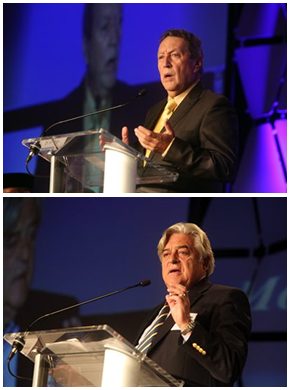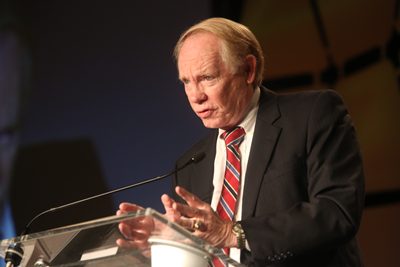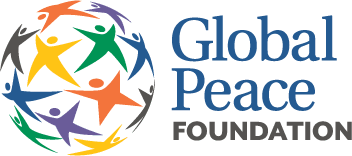
Former President of Guatemala Vinicio Cerezo (above) and former President of Uruguay Luis Alberto Lacalle.
ATLANTA, Dec. 2 —“I am convinced that the real crisis of the world is not a banking crisis, or an economic crisis; the crisis of the world is a lack of leadership, of moral values, and principles among people, countries, and the world,” declared former President of Guatemala Vinicio Cerezo at the opening plenary of the 2012 Global Peace Convention in Atlanta on November 30.
A distinguished panel from Latin America, Africa, and Asia offered different perspectives on ethical leadership and how such leadership is needed to meet the complex challenges of an increasingly integrated global community.
The Convention, “Moral and Innovative Leadership: Building Healthy Families, Ethical, Societies, and a Global Culture of Peace,” drew government and civil society delegates from 40 nations and included forums on interreligious collaboration, Korean reunification, western hemispheric integration, and other peace and development efforts around the world.
President Cerezo recalled a visit to Spain and the impression made on him of a heroic painting of Charles V, astride a white horse, with all the accouterments of power. “How did Charles V attain that position, I began to wonder.” As Pres. Cerezo studied about the monarch’s life he learned that he had been trained for leadership from his youth. The Dutch scholar Erasmus was asked to prepare a book on moral training for the future king, and his connection to his people and values he learned within his family were the foundation for his leadership of much of Europe.
“Today we have tools through communication and the internet to learn about the peoples of the world, and it is ever more important to ground that learning in values,” the former president said. “How can a leader make a decision when so many advisers are presenting different alternatives? Ultimately it is by the principles and values that one holds that determine what decision is made.”

Dr. Douglas Johnston, President of the International Center for Religion and Diplomacy
Dr. Said Aquiel Sirad, Executive Chairman of Nahdlatul Ulama, one of the largest Islamic organizations in the world, spoke of his commitment, as an Islamic leader, to help create a world without war and free of bloodshed. “The true peace is peace between all humans, countries, and religions, regardless of race, ethnicity or origin,” he said. “Islam, Christianity and Judaism all call for peace, love, harmony, equality and the promotion of human rights.” Dr. Douglas Johnston, President of the International Center for Religion and Diplomacy
Dr. Douglas Johnston, President of the International Center for Religion and Diplomacy, said perspective and moral leadership were essential in the pursuit of inter-religious peace building. “Empathy starts to take hold when a person can see through the eyes of another,” said Dr. Johnston. “Humankind will never realize its full potential unless we figure out how to better solve our differences.”
Former President of Uruguay Luis Alberto Lacalle added that “moral values are permanent and unchanging but their expression over time is different.” President Lacalle said leaders need to be innovative to know how to apply age-old morals during modern and contemporary times.
Another presenter, Dr. Manilal Chandaria, Chairman and CEO of the Comcraft Group from Kenya, stressed the the example of the civil rights movement led by Martin Luther King Jr. “The people of Africa draw inspiration from the legacy of Martin Luther King, who played a crucial role in making America what it is today,” said Dr. Chandaria.

From left: Dr. Said Aquiel Sirad, Executive Chairman of Nahdlatul Ulama; Dr. Manilal Chandaria, Chairman and CEO of the Comcraft Group; and Honorable Jae Yun Kim, a member of Korea’s National Assembly.
Honorable Jae Yun Kim, a member of Korea’s National Assembly, used the occasion to raise an important theme of the global assembly: the continuing division of the Korean peninsula. He praised the efforts of the Global Peace Foundation in building popular support for reunification and for citizen-based efforts to bridge the divisions between the two Koreas, including a bread factory that feeds 5000 people in the North every day.
Recalling Dr. Martin Luther King Jr. and his dream for freedom and equality, Hon. Kim said, “I also have a dream. It is a dream that the reunification of North and South Korea becomes a reality.”
The 2012 Convention in Atlanta emphasized the historic role of Atlanta native Dr. Martin Luther King Jr., and his commitment to nonviolent social change as a model of moral and innovative leadership. The Convention concludes on December 2.
